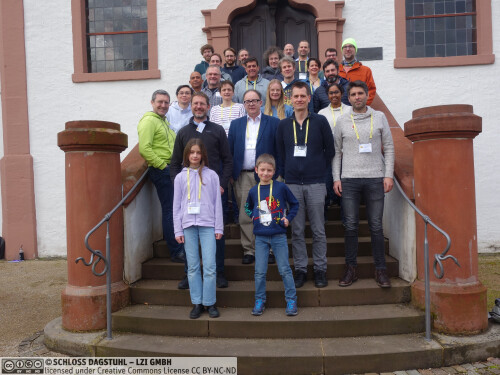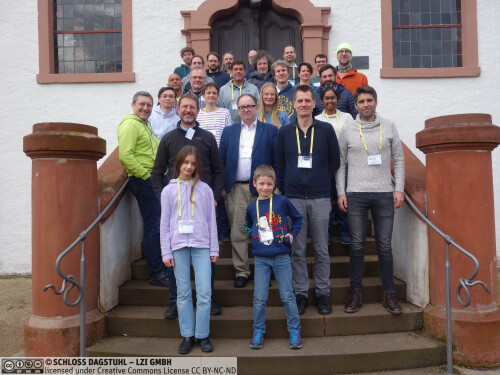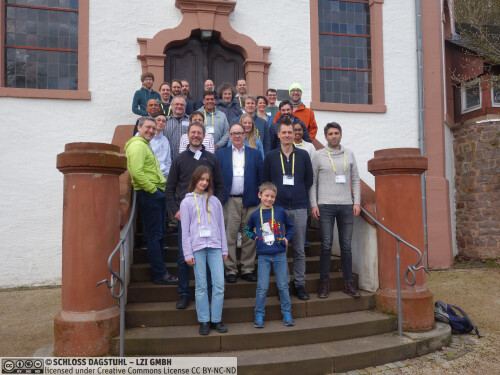Dagstuhl-Seminar 25092
Estimation-of-Distribution Algorithms: Theory and Applications
( 23. Feb – 28. Feb, 2025 )
Permalink
Organisatoren
- Josu Ceberio Uribe (University of the Basque Country - Donostia, ES)
- Benjamin Doerr (Ecole Polytechnique - Palaiseau, FR)
- John McCall (The Robert Gordon University - Aberdeen, GB)
- Carsten Witt (Technical University of Denmark - Lyngby, DK)
Kontakt
- Andreas Dolzmann (für wissenschaftliche Fragen)
- Susanne Bach-Bernhard (für administrative Fragen)
Gemeinsame Dokumente
- Dagstuhl Materials Page (Use personal credentials as created in DOOR to log in)
Programm
The Dagstuhl Seminar "Estimation-of-Distribution Algorithms: Theory and Practice" from February 23 to 28, 2025, brought together 25 international experts in the field of estimation-of-distribution algorithms (EDAs). EDAs iteratively evolve a distribution on the search space (called probabilistic model of the search space) in such a way that better solutions accumulate probability mass. Consequently, after running an EDA for sufficient time, one can obtain near-optimal solutions simply by sampling from this probabilistic model. The expertise of the seminar participants covered a broad variety of aspects ranging, in particular, from theoretical topics such as mathematical runtime analyses to an applied topics such as the solution of industrial optimization problems through EDAs.
The main aim of the seminar was to narrow the gap between theory and practice in EDAs by bringing together researchers from both sides and stimulating interaction. We facilitated this interaction through two long introductory talks on theory of EDAs and on typical applications of EDAs, through some regular conference-style talks discussing recent substantial results, short flash talks presenting new ideas and open problems, and breakout sessions for focused discussions. At all times, we left ample time for discussions, and flexibly adjusted the schedule to not cut short interesting discussions.
We believe that the seminar has succeeded its main aims of narrowing the gap between theory and practice in EDAs. This is visible from the high number of talks and the intensive discussions both in plenary and breakout sessions. Moreover, all participants attended essentially all sessions and all stayed for the full five days of the seminar. Given the large number of truly leading experts from academia and industry usually having overloaded schedules, this shows the success of the seminar, and the Dagstuhl Seminar center in general.
The seminar has identified several promising research directions, which can be explored in the reminder of this report. One that deserves particular mention is the relation of model-based genetic algorithms, that use additional mechanisms to understand the search space structure, and multi-variate EDAs, that try to understand the search space via the core working principles of EDAs. Here clearly a more intensive exchange of ideas is very promising, and will surely result from this seminar.
Overall, we feel that this was a very successful seminar, and, also in the name of the participants, we thank Dagstuhl for enabling us to conduct this seminar at Schloss Dagstuhl, which was the ideal place for this type of seminar.
 John McCall,, Josu Ceberio Uribe, Benjamin Doerr, and Carsten Witt
John McCall,, Josu Ceberio Uribe, Benjamin Doerr, and Carsten Witt
Estimation-of-distribution algorithms (EDAs) are a relatively recent type of randomized optimization heuristics that iteratively develop a probabilistic model of good solutions in the underlying search space. They thus differ from classical randomized heuristics such as local search, simulated annealing, or genetic algorithms in that they are not restricted to sets of search points as the only mean of carrying information from one iteration to the next. EDAs are successfully applied in various engineering areas. In the previous 7–8 years, they received increasing attention also in theoretical research, pointing out critical influences of their main parameters and rigorously demonstrating situations in which EDAs are superior to many classical approaches, among others, in leaving local optima and in dealing with noise. So far almost all theoretical efforts in EDAs have focused on understanding univariate probabilistic models. The benefits of EDAs, however, are likely to stand out even more if one considers multivariate EDAs, which empirically have been shown to outperform classical evolutionary algorithms on several classes of problems where learning dependencies among decision variables reveals itself to be crucial.
The purpose of this Dagstuhl Seminar is to bring together researchers from the theory and the applications of EDAs. In a small number of survey talks, they will summarize the state of the art in the sub-disciplines with significant recent progress. There will also be a small number of talks discussing in depth recent breakthrough results. A large proportion of the time will be devoted to discussions, both plenary and in small groups. In these, we shall try to clarify how the recent theoretical findings can be used to make EDAs more successful in practice, what experience in practice would be worth making rigorous via theoretical works, and what are the most interesting directions for future research, ideally via combined theoretical and applied approaches.
 Josu Ceberio Uribe, Benjamin Doerr, John McCall, and Carsten Witt
Josu Ceberio Uribe, Benjamin Doerr, John McCall, and Carsten Witt
Please log in to DOOR to see more details.
- Alistair Benford (University of Birmingham, GB) [dblp]
- Jasmin Brandt (Universität Paderborn, DE)
- Josu Ceberio Uribe (University of the Basque Country - Donostia, ES) [dblp]
- Duc-Cuong Dang (Universität Passau, DE) [dblp]
- Benjamin Doerr (Ecole Polytechnique - Palaiseau, FR) [dblp]
- Carola Doerr (Sorbonne University - Paris, FR) [dblp]
- Martin Fyvie (The Robert Gordon University - Aberdeen, GB) [dblp]
- Nikolaus Hansen (INRIA Saclay - Palaiseau, FR) [dblp]
- Jose Ignacio Hidalgo (Complutense University of Madrid, ES) [dblp]
- Joshua D. Knowles (SLB Cambridge Research, GB) [dblp]
- Timo Kötzing (Hasso-Plattner-Institut, Universität Potsdam, DE) [dblp]
- Martin S. Krejca (Ecole Polytechnique - Palaiseau, FR) [dblp]
- Johannes Lengler (ETH Zürich, CH) [dblp]
- John McCall (The Robert Gordon University - Aberdeen, GB) [dblp]
- Aishwarya Radhakrishnan (Hasso-Plattner-Institut, Universität Potsdam, DE) [dblp]
- Franz Rothlauf (Universität Mainz, DE) [dblp]
- Roberto Santana (University of the Basque Country - Donostia, ES) [dblp]
- Valentino Santucci (University for Foreigners of Perugia, IT) [dblp]
- Marcus Schmidbauer (Universität Passau, DE)
- Jonathan L. Shapiro (University of Manchester, GB) [dblp]
- Marta Rosa Soto Ortiz (CaixaBank Tech - Madrid, ES)
- Andrew M. Sutton (University of Minnesota - Duluth, US) [dblp]
- Dirk Thierens (Utrecht University, NL) [dblp]
- Vanessa Volz (CWI - Amsterdam, NL) [dblp]
- Carsten Witt (Technical University of Denmark - Lyngby, DK) [dblp]
Verwandte Seminare
- Dagstuhl-Seminar 22182: Estimation-of-Distribution Algorithms: Theory and Applications (2022-05-01 - 2022-05-06) (Details)
Klassifikation
- Artificial Intelligence
- Data Structures and Algorithms
- Neural and Evolutionary Computing
Schlagworte
- heuristic search and optimization
- estimation-of-distribution algorithms
- probabilistic model building
- machine learning





 Creative Commons BY 4.0
Creative Commons BY 4.0
